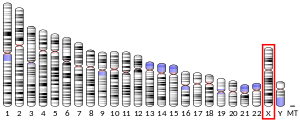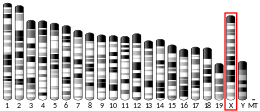Toll-like receptor 8
Toll-like receptor 8 is a protein that in humans is encoded by the TLR8 gene.[5] TLR8 has also been designated as CD288 (cluster of differentiation 288). It is a member of the toll-like receptor (TLR) family.
Function
[edit]TLR8 seems to function differently in humans and mice. Until recently, TLR8 was believed to be nonfunctional in mice, but it seems to counteract TLR7 activity[6][7]
The TLR family plays a fundamental role in pathogen recognition and activation of innate immunity. TLRs are highly conserved from Drosophila to humans and share structural and functional similarities. They recognize pathogen-associated molecular patterns (PAMPs) that are expressed on infectious agents, and mediate the production of cytokines necessary for the development of effective immunity. The various TLRs exhibit different patterns of expression. This gene is predominantly expressed in lung and peripheral blood leukocytes, and lies in close proximity to another family member, TLR7, on chromosome X.[8] Recent research has also shown the expression of TLR8 in hippocampal interneurons, with yet unknown function.[9]
TLR8 can recognize GU-rich single-stranded RNA.[10] However, the presence of GU-rich sequences in the single-stranded RNA is not sufficient to stimulate TLR8.[11] TLR8 recognizes G-rich oligonucleotides.[12] TLR8 is activated by ssRNA and forms a dimer complex when uridine released from the degraded ssRNA binds at one active site in between the dimers and a short oligonucleotide binds to another active site on the surface of the TLR8 structure.[13]
TLR8 is an endosomal receptor that recognizes single stranded RNA (ssRNA), and can recognize ssRNA viruses such as Influenza, Sendai, and Coxsackie B viruses. TLR8 binding to the viral RNA recruits the myeloid differentiation primary response protein 88 (MyD88) and leads to activation of the transcription factor NF-κB and an antiviral response that leads to proinflammatory cytokine synthesis.[14][15] TLR8 recognizes single-stranded RNA of viruses such as HIV and HCV.[10][11] TLR8 is also involved in the activation of dendritic cells to produce inflammatory factors to help regulate tumor growth, so TLR8 is often used as a target in the research for therapies in treating cancers including ovarian cancer and lymphomas.[15]
Clinical significance
[edit]Genetic variants in TLR8 has recently been linked to susceptibility to pulmonary tuberculosis.[16]
As a drug target
[edit]- TLR8 agonists (e.g. VTX-2337) have undergone clinical trials as immune stimulants in combination therapy for some cancers.[17]
- TLR8 antagonists (e.g. CU-CPT9a) may have therapeutic applications against autoimmune disorders.[18]
References
[edit]- ^ a b c GRCh38: Ensembl release 89: ENSG00000101916 – Ensembl, May 2017
- ^ a b c GRCm38: Ensembl release 89: ENSMUSG00000040522 – Ensembl, May 2017
- ^ "Human PubMed Reference:". National Center for Biotechnology Information, U.S. National Library of Medicine.
- ^ "Mouse PubMed Reference:". National Center for Biotechnology Information, U.S. National Library of Medicine.
- ^ Du X, Poltorak A, Wei Y, Beutler B (September 2000). "Three novel mammalian toll-like receptors: gene structure, expression, and evolution". European Cytokine Network. 11 (3): 362–71. PMID 11022119.
- ^ Demaria O, Pagni PP, Traub S, de Gassart A, Branzk N, Murphy AJ, Valenzuela DM, Yancopoulos GD, Flavell RA, Alexopoulou L (October 2010). "TLR8 deficiency leads to autoimmunity in mice". The Journal of Clinical Investigation. 120 (10): 3651–62. doi:10.1172/JCI42081. PMC 2947223. PMID 20811154.
- ^ Sarvestani ST, Williams BR, Gantier MP (August 2012). "Human Toll-like receptor 8 can be cool too: implications for foreign RNA sensing". Journal of Interferon & Cytokine Research. 32 (8): 350–61. doi:10.1089/jir.2012.0014. PMID 22817608.
- ^ "Entrez Gene: TLR8 toll-like receptor 8".
- ^ Seizer L, Rahimi S, Santos-Sierra S, Drexel M (2022) Expression of toll like receptor 8 (TLR8) in specific groups of mouse hippocampal interneurons. PLoS ONE 17(5): e0267860. https://doi.org/10.1371/journal.pone.0267860
- ^ a b Heil F, Hemmi H, Hochrein H, Ampenberger F, Kirschning C, Akira S, Lipford G, Wagner H, Bauer S (March 2004). "Species-specific recognition of single-stranded RNA via toll-like receptor 7 and 8". Science. 303 (5663): 1526–9. Bibcode:2004Sci...303.1526H. doi:10.1126/science.1093620. PMID 14976262. S2CID 1680581.
- ^ a b Zhang Y, El-Far M, Dupuy FP, Abdel-Hakeem MS, He Z, Procopio FA, Shi Y, Haddad EK, Ancuta P, Sekaly RP, Said EA (July 2016). "HCV RNA Activates APCs via TLR7/TLR8 While Virus Selectively Stimulates Macrophages Without Inducing Antiviral Responses". Scientific Reports. 6: 29447. Bibcode:2016NatSR...629447Z. doi:10.1038/srep29447. PMC 4935957. PMID 27385120.
- ^ Peng G, Guo Z, Kiniwa Y, Voo KS, Peng W, Fu T, Wang DY, Li Y, Wang HY, Wang RF (August 2005). "Toll-like receptor 8-mediated reversal of CD4+ regulatory T cell function". Science. 309 (5739): 1380–4. Bibcode:2005Sci...309.1380P. doi:10.1126/science.1113401. PMID 16123302. S2CID 11952027.
- ^ Tanji H, Ohto U, Shibata T, Taoka M, Yamauchi Y, Isobe T, et al. (February 2015). "Toll-like receptor 8 senses degradation products of single-stranded RNA". Nature Structural & Molecular Biology. 22 (2): 109–115. doi:10.1038/nsmb.2943. PMID 25599397. S2CID 32208414.
- ^ "TLR7 and TLR8: Key players in the antiviral response - Innate immunity". invivoGen. Fall 2006.
- ^ a b Huang X, Zhang X, Lu M (August 2021). "Recent trends in the development of Toll-like receptor 7/8-targeting therapeutics". Expert Opinion on Drug Discovery. 16 (8): 869–880. doi:10.1080/17460441.2021.1898369. PMID 33678093. S2CID 232141585.
- ^ Davila S, Hibberd ML, Hari Dass R, Wong HE, Sahiratmadja E, Bonnard C, Alisjahbana B, Szeszko JS, Balabanova Y, Drobniewski F, van Crevel R, van de Vosse E, Nejentsev S, Ottenhoff TH, Seielstad M (October 2008). "Genetic association and expression studies indicate a role of toll-like receptor 8 in pulmonary tuberculosis". PLOS Genetics. 4 (10): e1000218. doi:10.1371/journal.pgen.1000218. PMC 2568981. PMID 18927625.
- ^ "Immune Stimulant No Help When Added to Chemotherapy for Recurrent Ovarian Cancer". Targeted Oncology. March 2017.
- ^ Hu Z, Tanji H, Jiang S, Zhang S, Koo K, Chan J, Sakaniwa K, Ohto U, Candia A, Shimizu T, Yin H (October 2018). "Small-Molecule TLR8 Antagonists via Structure-Based Rational Design". Cell Chemical Biology. 25 (10): 1286–1291.e3. doi:10.1016/j.chembiol.2018.07.004. PMC 6195466. PMID 30100350.
Further reading
[edit]- Lien E, Ingalls RR (January 2002). "Toll-like receptors". Critical Care Medicine. 30 (1 Suppl): S1-11. doi:10.1097/00003246-200201001-00001. PMID 11782555.
- Kaisho T, Akira S (February 2002). "Toll-like receptors as adjuvant receptors". Biochimica et Biophysica Acta (BBA) - Molecular Cell Research. 1589 (1): 1–13. doi:10.1016/S0167-4889(01)00182-3. PMID 11909637.
External links
[edit]- Toll-Like+Receptor+8 at the U.S. National Library of Medicine Medical Subject Headings (MeSH)
- PDBe-KB provides an overview of all the structure information available in the PDB for Human Toll-like receptor 8 (TLR8)





